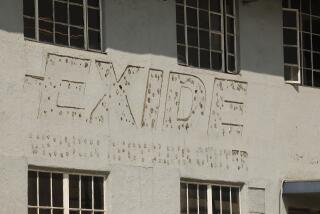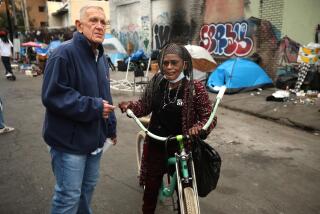Deciding Vernon’s fate
- Share via
Sometimes, it’s the basic questions that most confound us. For example: What exactly is a city?
This question matters when it comes to ethically challenged Vernon, a municipality of only about 90 residents, the vast majority of whom live in city-owned housing and for the most part are in some way financially beholden to the city government. Vernon, for those who haven’t been following the saga, is the tax-rich industrial town with nearly 2,000 businesses where the former mayor and his wife were convicted of voter fraud last year because they set up an elaborate ruse to hide the fact that they actually lived in Hancock Park; the enclave where newcomers who sought to challenge its power structure were evicted, their voter registration canceled, their power cut off and their cars followed. It’s the city that suspended elections when they might have gone against the entrenched leaders. City positions have been handed down from father to son or grandson as though municipal government was a family business. Various charges have been filed against Vernon’s ruling elite through the decades, and some have resulted in convictions, but city business has gone on pretty much as usual.
Los Angeles County Dist. Atty. Steve Cooley and a handful of other officials are now bent on stopping the shenanigans in Vernon by yanking away its status as a city, which would probably require a law to be passed by the Legislature. The disincorporation movement gained steam after the California attorney general’s office expanded its own investigation into the lavish perks that city officials have received over the years, including big salaries, first-class plane tickets, limo service and a Cadillac Escalade.
This is not to suggest that luxurious goodies for public officials are a reason to dissolve the city (as long as the voters know about the perquisites and there is room in the city budget for them). The problem with officials’ inflated compensation in the city of Bell was that city voters had been duped into allowing the larger salaries, which were then kept secret from them despite state public information laws, and then were expanded while city services were cut.
Nor is repeated misdoing by municipal leaders a valid reason to disincorporate a city against its will. The state has laws to protect the public against voter fraud, bribery, public corruption and other such offenses. Prosecutors point out that judges are generally reluctant to mete out prison sentences for such white-collar crimes, but the solution to that problem is better laws and judges.
The bigger question regarding Vernon is whether it is, in fact, a city. Can any landowner draw up some boundaries and call himself a city? That’s pretty much the way Vernon got its start in 1905, when a rancher persuaded railroad executives to run spur lines into his area and then incorporated the adjacent land as the first “exclusively industrial” city in the Southwest. Vernon would have had little chance of incorporating in more recent times, after the Local Agency Formation Commissions were established in the 1960s to oversee the orderly creation of local government agencies.
But disincorporation under the Los Angeles LAFCO would require the approval of Vernon’s few dozen voters, and it’s unlikely that people whose housing and incomes depend on the continuation of the city would be interested in ending its existence.
No California city has ever been disincorporated against its will; the cases nationwide could be counted on your fingers. One city in Ohio was dissolved by that state after it was found to have been established by a landowner whose main interest was to raise money by stopping cars for speeding. Vernon’s origins, and its operations since, come close to that scenario.
Still, the forced disincorporation of a city would set a precedent that all Californians should consider warily. Most cities are created by groups of people — admittedly, much larger groups than Vernon — who see a benefit to themselves, both financial and democratic, by defining their area as a separate governmental entity. Does the fact that Vernon was established to benefit a family or two undermine its validity as a city?
In this case, it might. One important aspect of cityhood is that it brings democracy closer to home, allowing residents of a small community to freely express opinions, vote and run for office. But there is a legitimate question as to whether Vernon was ever set up to run as a democratic local government, and whether it ever could. Clearly, people who disagree with the city leadership have not been able to freely move into or stay in the city — a basic tenet of a free society — or to run for office or set up a political base that opposes the existing power structure. In that sense, Vernon may have been a fraudulent city from the start.
If Vernon is, in fact, structurally incapable of behaving democratically, disincorporation might be the only solution. But these questions should be decided by experts, not politicians. The best next step is for the L.A. LAFCO to launch a disincorporation study to determine exactly what constitutes a city and whether Vernon meets the criteria. Another issue that should be decided by LAFCO rather than politicians is what would happen to the tiny area and its mighty industrial base if the city is dissolved. The Los Angeles City Council already has its eye on annexation, but other, smaller cities in the southeast corridor might be equal or stronger contenders. LAFCO was created to make these very decisions.
More to Read
Sign up for Essential California
The most important California stories and recommendations in your inbox every morning.
You may occasionally receive promotional content from the Los Angeles Times.













